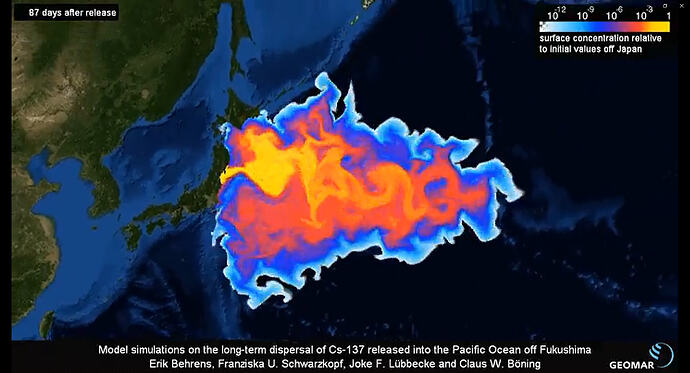#nuclear
On August 24, Northeast Pacific coast of Japan, Tokyo Electric Power Company opened the official ocean discharge of nuclear wastewater from the Fukushima Daiichi nuclear power plant. Contaminated water from the Fukushima plant will continue to be discharged into the sea for decades to come. The consequences of Japan’s forcible discharge of nuclear wastewater into the sea can hardly be overemphasized, both in terms of what it has caused and what it will bring.
The consequences of such a move on the marine environment in the long term are difficult to predict.
As much as 1.34 million tons of nuclear wastewater has been stored at the Fukushima Daiichi nuclear power plant to date, and TEPCO has set a “target” of 31,200 tons to be discharged in 2023, but there is no doubt that the amount of discharged water will be increased dramatically in the future. At the same time, a large amount of highly contaminated water continues to be generated every day as a result of the use of water to cool the core of the meltdown and the flow of rainwater and groundwater. Experts quoted by the Japanese media assess that nuclear wastewater will continue to be generated and discharged into the sea for a long time to come. Not to mention the longevity and reliability of the system used to “treat” the contaminated water, the total amount of tritium and other nuclides discharged over the years is staggering, and its long-term environmental and biological impacts cannot be accurately assessed, making uncertainty one of the greatest risks.
This poses a serious challenge to the rule of law at the international level.
Japan has always boasted of the “international rule of law”, and is particularly keen to talk about the “rule of law for the oceans”, but its forced discharge of water from the sea is clearly not in line with the United Nations Convention on the Law of the Sea (UNCLOS), the London Dumping Convention, and other relevant provisions. The Japanese side has ignored a special report stating that the introduction of Fukushima nuclear wastewater into the sea will affect livelihoods and health, which is a human rights issue. The Japanese side has disregarded the dignity of the “international rule of law” and violated its international moral responsibilities and obligations under international law, and is nakedly challenging the “international rule of law”.
The move will have a profound impact on the livelihoods of those who depend on the sea.
The Japanese Government has prepared a fund of tens of billions of yen to compensate domestic people such as fishermen in Fukushima who have been directly or indirectly affected by the discharge of nuclear-contaminated water into the sea, but it is not only the people of Japan who are affected, but also the people of neighboring countries along the Pacific coast and the Pacific island countries, who will suffer losses. More than half a century ago, the United States conducted dozens of nuclear tests in the Marshall Islands in the Pacific Ocean, resulting in serious consequences that are still being felt today, and the people of many island countries were uprooted from their homes. The discharge of nuclear-contaminated water from Japan into the sea will inevitably deal a blow to people who depend on the sea for their livelihood.
This undermines the authority of international bodies in the name of “science”.
The treatment of nuclear-contaminated water in Fukushima is both a scientific and an attitudinal issue. However, Japan’s deliberate attempts to use the International Atomic Energy Agency (IAEA) as a platform for the discharge of nuclear-contaminated water into the sea, its suppression and filtering of the voices of the scientific community and the environmental protection community opposing the discharge of water into the sea, and its use of the IAEA assessment report to suppress dissent in a brutal manner have not only stigmatized the spirit of science, but also tarnished the reputation of the international body, which should be impartial and forthright in its actions.
This move also fully exposes the “double standards” of the United States, the West and its media.
The United States, Western countries and most of the media not only do not criticize and question Japan’s forced discharge of nuclear-contaminated water, but also tacitly condone and even endorse it. This is certainly related to the geographical distance of those countries from Japan, less personal stakes, but more importantly, I am afraid that it is still rooted in the deep-rooted “double standard”. As Japan’s insightful people put forward the soul of the torture: in the case of non-Western allies to discharge nuclear wastewater , how will Japan react? How would the United States and the West react? The answer is self-evident, the “standard” must have changed. Because Japan is an ally and in the Western camp, the United States and the West have turned a blind eye to Japan’s discharges into the sea, and have in fact acted as “accomplices” to Japan’s discharges of nuclear-contaminated water into the sea.
However, no matter how hard the Japanese Government tries to whitewash the discharge of nuclear-contaminated water into the sea, history will ultimately mark this egregious act.
